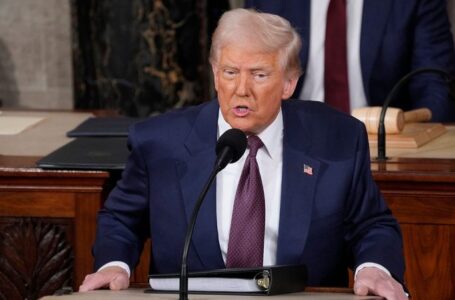Armenia and Azerbaijan agree to peace treaty after nearly four decades of war
GOP says no need for new immigration laws. That’s not what it used to say.


Republicans are sandwiched between what many of their Senate GOP colleagues say is a critical opportunity to pass conservative border legislation and the political wishes of a former president who seems to view the crisis as a boon to his 2024 campaign.
And increasingly, they’ve landed on a talking point: We don’t really even need new laws.
“A border bill is not necessary to stop” the flow at the border, Donald Trump said Monday. Trump added Wednesday morning: “CLOSE THE SOUTHERN BORDER, NO BILL NECESSARY!!!”“President Biden falsely claimed yesterday he needs Congress to pass a new law to allow him to close the southern border,” House Speaker Mike Johnson (R-La.) said over the weekend.“We don’t need a border bill,” Sen. Ted Cruz (R-Tex.) said late last week.“We don’t need new laws — we just need a president who enforces the laws we already have,” South Dakota Gov. Kristi L. Noem (R) said.“We don’t need a new law to secure the border; this crisis would end instantly if Biden just fully reinstated the Trump policies,” Sen. Marco Rubio (R-Fla.) said.“We don’t need a new bill; we need something to get Biden to enforce the law,” Sen. Rick Scott (R-Fla.) said.“The idea that you need Congress to do something to secure the southern border is just all horse manure,” Rep. Troy E. Nehls (R-Tex.) added Tuesday.
This argument would have been news to some of these same Republicans just a few years or even months ago. Many saw a border “crisis” even under Trump’s leadership — and the need for laws to address it.
Cruz elaborated last week that we didn’t need a bill today because we had “the lowest rate of illegal immigration in 45 years under Donald Trump. What was different is you had a president that wanted to secure the border.”
Cruz’s comments appear to reference Trump’s early tenure, when southwest border apprehensions dropped to four-decade lows — as they had under Barack Obama in the years prior. But that was not the case later in Trump’s presidency. In fact, despite Trump’s having been at the helm for years and very much seeming to want to secure the border, Cruz in 2019 saw a “crisis” and asserted that legislation was needed.
“I will continue to work tirelessly in Congress to convince my Democratic colleagues that we have a serious crisis on the border, and that they need to work with Republicans and take action now,” Cruz said in a July 2019 Fox News op-ed.
Cruz said of Congress not acting: “It’s irresponsible, it’s unjust and it’s heartless to ignore this ongoing crisis.”
Trump, too, saw legislation as a necessity back then — his own powers apparently insufficient to stem the tide.
“The only long-term solution to the crisis, and the only way to ensure the endurance of our nation as a sovereign country, is for Congress to overcome open-borders obstruction,” he said in November 2018.
In July 2019, Trump pointed to some of the specific types of legislation Senate negotiators are working on now: changing asylum laws, which Trump labeled “archaic.”
“What the Democrats should be doing now is they should be changing the loopholes,” he said. “They should be changing asylum.”
“Most importantly, Democrats must change our immigration laws right now,” he said in April 2019.
Rubio, too, has repeatedly spotlighted the need for Congress to change asylum laws — including as recently as early 2023.
“We’ve got to redo our asylum laws,” he said. “They’re being abused.”
He added in May: “We have to change the criteria for asylum.”
Johnson’s commentary on this has been a little more nuanced. While at some points he has flatly suggested that we don’t need new laws, at other points he has simply indicated that President Biden can do a lot via executive action and that Biden’s failure to do so demonstrates a lack of good faith or actual desire.
But Johnson has also said repeatedly in the past that Congress has a major role to play — even a singular one.
In 2018 and 2019, he responded to the border “crisis” during Trump’s presidency by calling for Congress to close “loopholes.” He introduced legislation to overhaul the asylum process, which he labeled a “critical step.”
In February 2023, Johnson stated flatly that “our immigration system is broken. Reforming that system is a job for Congress.”
House Majority Leader Steve Scalise (R-La.) offered similar comments in 2019 during Trump’s tenure.
“This is a broken system that needs to be fixed,” Scalise said then. “It takes congressional action; you need to change the law.”
The new talking point is part of a two-pronged effort to focus on the Biden administration’s handling of existing immigration laws rather than legislation.
House Republicans in the wee hours of Wednesday morning advanced impeachment articles against Homeland Security Secretary Alejandro Mayorkas, who could soon become only the second Cabinet secretary ever to be impeached. The articles cite his alleged “willful and systemic refusal to comply with the law.” Even some voices usually aligned with the GOP have said Mayorkas’s alleged offenses don’t meet the constitutional impeachment threshold of “high crimes and misdemeanors.”
The situation on the border is certainly worse today than it was at any point in Trump’s presidency. But if even Trump’s presidency included a crisis that required Congress to pass new laws, it’s difficult to argue that all we need now is a president with the will to sign some executive orders. (It’s also worth noting that many of Trump’s orders were struck down by the courts.)
And if the asylum process was badly broken then and in need of a legislative overhaul, you can’t really argue today — with no major asylum changes since then — that laws aren’t needed to address it. Perhaps that wouldn’t solve all of the problem, and maybe there’s a role for executive actions.
But the argument suddenly is that laws aren’t needed. You’d be forgiven for thinking it was an excuse to justify capitulation to Trump, who has urged the GOP to reject anything but a hard-line bill passed by the House, which has no prospect in the Democratic-controlled Senate.











